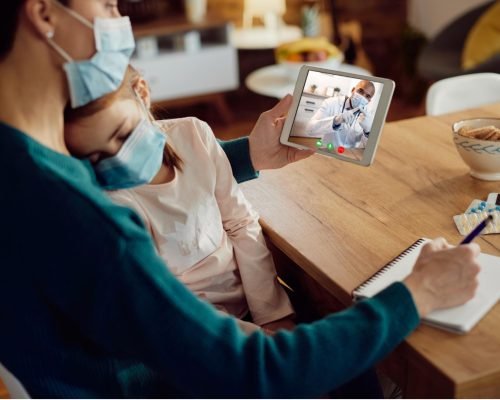The healthcare industry is undergoing rapid evolution, with digital transformation in healthcare emerging as a global priority. Clinics worldwide are no longer confined to traditional brick-and-mortar limitations—they are embracing digital technologies to optimize patient care, improve efficiency, and meet the growing demand for accessible, real-time medical services.
The Global Shift Toward Digital Healthcare
The digital age has revolutionized nearly every industry, and healthcare is no exception. Clinics across continents are transitioning from paper records, face-to-face-only appointments, and siloed systems to cloud-based platforms, telemedicine implementation, and integrated healthcare technology advancements. The push toward digital transformation in healthcare has been accelerated by both innovation and necessity, especially following the COVID-19 pandemic.
Why Clinics Are Embracing Digital Transformation
Improved Access and Patient Experience
One of the major advantages of going digital is improved access to care. With remote consultation services, patients in rural or underserved areas can now reach specialists without the burden of travel. This convenience also contributes to higher patient satisfaction and retention.
Operational Efficiency
Digitally enabled clinics automate administrative workflows, from scheduling and billing to inventory management. This allows medical professionals to focus more on patient care and less on paperwork.
Enhanced Data Management
With Electronic Health Records (EHRs), clinics can centralize patient data, enabling faster decision-making and more accurate diagnoses.
Global Digital Health Trends Driving Change
Remote Care and Telehealth
Telehealth is no longer an emerging trend—it’s a standard. Clinics in countries like the United States, India, and Australia have adopted telemedicine implementation strategies at scale, allowing video consultations, remote diagnostics, and virtual follow-ups.
Artificial Intelligence in Diagnosis
AI is being used to detect early signs of diseases like cancer, diabetic retinopathy, and more. Clinics that embrace AI tools are seeing enhanced diagnostic accuracy and faster turnaround times.
Wearable Health Monitoring
From smartwatches to glucose monitors, wearable devices are changing how patients and clinicians track health metrics. These devices are increasingly being integrated into clinical care pathways.
Mobile Health Applications
Patients now use mobile apps for appointment booking, medication reminders, and virtual check-ins. Clinics offering app-based interactions report higher engagement and better chronic disease management outcomes.
Digital Clinics Worldwide: Leading the Change
North America: United States & Canada
In the U.S., major health systems have rapidly adopted telehealth and EHRs. Clinics are leveraging integrated platforms like Epic and Cerner, while smaller practices turn to cloud-based solutions. Canada, with its universal healthcare model, has prioritized telemedicine for rural communities.
Europe: UK, Germany & Scandinavia
The NHS in the UK has seen massive strides in digital adoption, including virtual GP services and electronic prescription services. Germany’s Digital Healthcare Act promotes digital health apps (DiGA), while Scandinavian countries lead in health data interoperability.
Asia: India, China & Singapore
India is home to a booming telemedicine market, especially in Tier 2 and Tier 3 cities. Startups like Practo and mFine have revolutionized digital consultations. China leverages AI and big data for predictive healthcare, and Singapore focuses on national health tech platforms for streamlined services.
Africa: Kenya, Nigeria & South Africa
With mobile technology penetration, African clinics are skipping traditional infrastructure and adopting mHealth solutions directly. Kenya’s M-TIBA platform connects patients, providers, and payers through mobile technology.
Latin America: Brazil, Mexico & Argentina
Telehealth regulations are evolving rapidly, allowing for the growth of virtual clinics. Many clinics now offer hybrid care models, integrating in-person and digital services.
Clinic Digital Adoption: Key Challenges and Enablers
Challenges in Digital Transition
- Infrastructure Limitations
In low-resource settings, clinics may lack stable internet connections or access to modern devices. - Training and Resistance to Change
Healthcare professionals often require extensive training to effectively use new systems. Resistance to change can slow down adoption. - Privacy and Regulatory Concerns
Protecting patient data is crucial. Clinics must comply with regulations like HIPAA (U.S.), GDPR (Europe), or local equivalents.
Enablers for Digital Success
- Government Incentives and Policies
Policies that encourage or mandate digitization are major drivers. Incentive programs can ease the financial burden on clinics. - Public-Private Partnerships
Collaborations with tech companies accelerate innovation. Many clinics partner with health tech firms for custom digital solutions. - User-Friendly Platforms
The success of digital transformation in healthcare often depends on how intuitive the technology is—for both providers and patients.
Telemedicine Implementation: A New Era in Patient Care
Telemedicine stands at the forefront of digital healthcare. Clinics are not only offering video consultations but also virtual diagnostics, prescription renewals, and chronic disease management through digital platforms.
- Synchronous Telehealth: Real-time video or voice consultations.
- Asynchronous Telehealth: Messaging platforms and recorded videos.
- Remote Patient Monitoring (RPM): Devices send real-time health data to clinics
By integrating telemedicine implementation into routine care, clinics can reduce patient wait times, increase service reach, and enhance treatment adherence.
Healthcare Technology Advancements Shaping the Future
The future of clinics lies in adopting technologies that can adapt to patient needs and evolving care models.
- Cloud Computing: Enables remote access to health data, ensuring care continuity across locations.
- AI and Machine Learning: Automates diagnostics, triages cases, and predicts disease outbreaks.
- Blockchain: Strengthens data security and transparency in patient record sharing.
- Internet of Medical Things (IoMT): Connects medical devices for seamless data flow.
These healthcare technology advancements are not just futuristic add-ons—they are becoming essential for clinics aiming to stay relevant and efficient.
Best Practices for Clinics Going Digital
Start Small, Scale Gradually
Begin with one area—like online scheduling or EHRs—before scaling to full telemedicine services.
Train Staff Thoroughly
Ensure your team understands both the “how” and “why” behind digital tools.
Engage Patients Early
Make patients comfortable with new technologies through guided onboarding and support.
Measure Impact
Use KPIs like patient wait times, engagement rates, and clinical outcomes to gauge the success of digital initiatives.
How DigitalRX.io Accelerates Digital Transformation in Healthcare
A Full‐Stack SaaS Solution for Modern Clinics
Clinics around the world are increasingly embracing digital transformation in healthcare, and platforms like DigitalRX.io are leading the charge. Within 24 hours, clinics can launch branded websites, mobile apps, and doctor portals—complete with appointment booking, telemedicine, and e‑prescription tools .
Seamless Telemedicine Implementation
DigitalRX.io offers in‑built HD video calling directly through clinic apps and websites, supporting telemedicine implementation without relying on external services. Doctors can securely hold consultations, issue prescriptions, and share follow-up care, all within a HIPAA‑ and GDPR‑compliant environment .
Smart Features That Drive Clinic Digital Adoption
- Appointment booking engine with instant notifications—patients can book in‑person or video visits in minutes .
- Analytics dashboard—clinics gain insights on appointment trends, patient demographics, no‑shows, and revenue, key for tracking healthcare technology advancements in action .
Safe, Efficient Data Migration
Switching from legacy systems is simplified with DigitalRX.io’s structured data migration process: audit, clean, map, import, test, and secure . This ensures smooth transfer of patient records and appointment history, preserving data integrity and clinical continuity.
Why Clinics Choose DigitalRX.io
| Benefit | Description |
| Fast Launch | Complete clinic presence within one day, no developer needed |
| Security & Compliance | Enterprise‑grade encryption, multi‑factor authentication, HIPAA/GDPR‑ready |
| Scalable Design | Supports multi‑doctor, multi‑specialty use, and growing practices |
| Patient Engagement | Chat, doctor wall, pill reminders, treatment tracking—all integrated |
| Revenue Growth | Built‑in SEO boosts online visibility; engagement features help clinics grow |
Get Started: Move Your Clinic Online Today
Ready to join the digital revolution in healthcare? With DigitalRX.io, launching a professional, secure, and patient-friendly clinic website and app is both fast and cost-effective.
Take the leap now—schedule your free trial and explore how DigitalRX.io can transform your practice.
Conclusion: The Future Is Digital, and It’s Already Here
The world is witnessing a clear and irreversible shift toward digital transformation in healthcare. Clinics—whether small community-based practices or multi-location health centers—are adopting digital solutions to stay agile, connected, and efficient. From embracing telemedicine implementation to harnessing healthcare technology advancements, the global wave of digitization is leveling the playing field and making quality care more accessible.
FAQs
1. What services does DigitalRX.io provide to support digital transformation in healthcare?
DigitalRX.io offers a comprehensive SaaS platform that enables clinics to launch branded websites, mobile apps, and doctor portals within 24 hours. Features include online appointment booking, HD video consultations (telemedicine implementation), e-prescriptions, patient onboarding forms, and integrated remote patient monitoring—designed to streamline clinic operations and improve patient engagement.
2. How does DigitalRX.io ensure clinic digital adoption without needing a tech team?
No coding or dedicated developers are required. DigitalRX.io delivers white-label website and app solutions, complete with your logo, domain, and design ready to go live within a day. It includes built-in telehealth, appointment scheduling, secure payments, and analytics—facilitating fast, effortless adoption.
3. Is patient data secure and compliant with global regulations?
Yes. DigitalRX.io prioritizes data protection through end-to-end encryption, multi-factor authentication, and continuous threat monitoring. It is fully compliant with HIPAA, GDPR, and other relevant standards—ensuring that patient information remains confidential and secure.
4. Can DigitalRX.io support both virtual and in-person clinics?
Absolutely. The platform supports a hybrid model, offering both virtual consultations and in-person appointments on a single platform. Patients can easily book video or clinic visits, with seamless integration of scheduling, payments, patient records, and remote monitoring for complete flexibility.
5. How does DigitalRX.io help clinics stay aligned with global digital health trends?
DigitalRX.io integrates modern tools like telemedicine, AI-powered analytics, remote patient monitoring, and mobile-first design—all of which reflect the latest global digital health trends. By offering these features in a unified platform, it helps clinics stay competitive, efficient, and patient-centric in today’s fast-evolving healthcare landscape.











